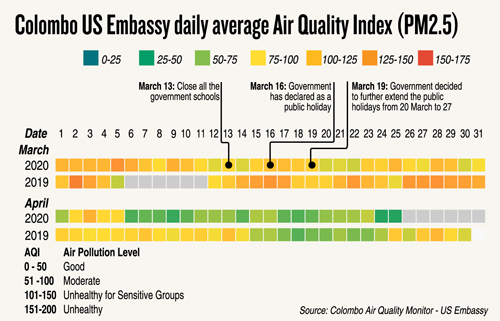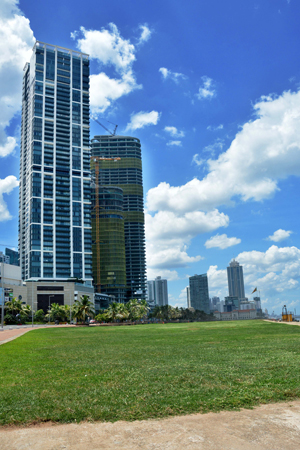News
Island breathes easier, nature recovers
 The month-long lockdown due to the coronavirus pandemic has helped to restore the waters of rivers, improved the air quality, and reduced the amount of plastics washed out to sea.
The month-long lockdown due to the coronavirus pandemic has helped to restore the waters of rivers, improved the air quality, and reduced the amount of plastics washed out to sea.
Strangely, the Galle Face green promenade, too is living up to its name.
In the past few weeks, the Central Environment Authority claims the air quality index at its three monitoring stations — two at Battaramulla and one in Kandy — was hovering near the yellow shade, indicating moderate levels of pollution.
The Environmental Pollution Control Division, said that in the past three weeks the air quality levels stood between 50 to 100.
Deputy Director General, Mr. K.N Muthukudarachchi, attributed this to the absence of emissions.
Vehicles are a leading cause of air pollution.
“Vehicle emissions have a direct co-relation to the index. Sixty percent of the emissions come from the country’s fleet of vehicles and the balance 40% from power plants at Sapugaskanda and Kelaniya,’’ he said.
However, he conceded that air quality had always been moderate.

Galle Face Green: Living up to its name
“Even during New Delhi’s worst toxic smog last November our levels remained yellow [in the index],’’ he said.
Meanwhile, the Marine Environment Protection Authority (MEPA) said that the seas along the shores of Galle, Matara, Kalutara, and Negombo have shown a 40% reduction in polythene waste.
General Manager, Dr Terney Pradeepkumara, said that the coastal waters are much cleaner because of the absence of tourists and locals who litter.
Also, there has been a drop in the amount of nitrogen and phosphates in the sea.
The nutrients that come from run off water from rivers can promote algae growth.
In normal times, nutrients in the fertilisers from agri lands gets washed into the rivers and to the sea, promoting algal growth. These weeds can deplete the oxygen in the waters killing aquatic life.
Faecal pollution into the sea has also reduced because of the strict rules preventing people from leaving their homes. Most costal area residents use the beach to defecate.
The Colombo Municipal Council (CMC) is also collecting less solid waste in and around the city.
Commissioner, Roshanie Dissanayake, said that there is a 50% reduction in the volume of garbage collected.
She attributes the reduced volumes to the closure of hotels, eateries, and offices.
“We collect around 200 metric tons per day,’’ she said, compared with 550 metric tons a day before the curfew. Household waste is also reduced.
This, and the present focus on high risk areas, has prompted the CMC to reduce its frequency of collection. “Our workers collect only every three days,’’ Ms Dissanayake said.
There has been a considerable shift in the air quality of Colombo since lockdown was imposed.
According to the US Embassy Daily Average air quality index, in April, Colombo’s index has hovered around 50 to 100 indicating moderate levels.
The index moved more towards the green shade (25 -50) for 11 days compared to 4 days of green in April 2019.
In the rest of the days the pointer had howered between 51 to 100 (yellow) indicating moderate levels


